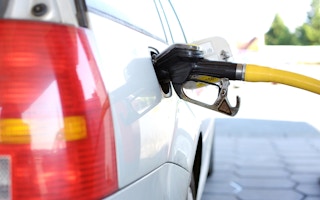It’s been just over two months since the people—or the rakyat—voted the Pakatan Harapan (PH) coalition into power.
To continue reading, subscribe to Eco‑Business.
There's something for everyone. We offer a range of subscription plans.
- Access our stories and receive our Insights Weekly newsletter with the free EB Member plan.
- Unlock unlimited access to our content and archive with EB Circle.
- Publish your content with EB Premium.
Malaysia’s 14th general election has brought many firsts for the country. Among them is the Ministry of Energy, Science, Technology, Environment and Climate Change (MESTECC). Helmed by Cambridge-educated engineer Yeo Bee Yin, it is the first time climate change has been given prominence in the naming of a ministry. It’s a small win in our fight against climate change, but much more needs to be done.
In almost the same time it’s taken to form a climate change ministry, the Malaysian government has spent RM1.4 billion on fuel subsidies, as estimated by political party Parti Keadilan Rakyat (People’s Justice Party) vice president, Rafizi Ramli, in a recent blog post.
Soon after winning the general election, Prime Minister Mahathir Mohamad announced that the weekly price float mechanism for RON95 (a more affordable variant of petrol) and diesel would be removed, fixing them at affordable rates of RM2.20 and RM2.18 per litre respectively. This price fix will remain in place until the end of the year as the government studies potential avenues to implement its targeted fuel subsidy policy outlined in the PH manifesto.
Continued subsidies will only portray an artificially low cost of fuel to the rakyat, while encouraging private vehicle usage, leading to more urban road congestion and increased carbon emissions. This leads us down a dangerous path of normalising subsidies once again—at a time when it’s more important than ever to wean ourselves off fossil fuels.
As a signatory to the Paris Agreement, Malaysia has pledged to unconditionally reduce greenhouse gas emissions intensity of GDP by 35 per cent by 2030, relative to 2005 levels, in efforts to keep global temperature increase below the 2-degree Celsius ceiling. The reintroduction of fuel subsidies completely contradicts this. The government is paying money to continue to emit carbon, at a time when expenditure is becoming increasingly scrutinised.
The moral reasons notwithstanding, the reintroduction of fuel subsidies may be popular and well received by the general Malaysian population. The PH coalition ran on a pro-rakyat, pro-welfare platform, emphasising the need for a reform to the high cost of living. Throwing fuel subsidies into the bucket of tactics to reduce cost of living is short sighted and exactly where we need to have a conversation about externalised costs.
While the rakyat may benefit from more affordable fuel at point of sale, the true cost—or externalised cost—is not appropriately accounted for. When we pay RM2.20 per litre at the petrol station, we are not considering the cost of health implications from pollution, the cost of loss of biodiversity, the cost of loss of agricultural productivity, along with all other hidden costs related to carbon emissions and climate change.
While even the market price of fuel would not adequately cover all of these additional externalised costs, we should not be paying any less than that. When considering the welfare of the rakyat, the PH government needs to have more future-oriented solutions revolving around sustainable development, good public transportation and renewable energy policies—further supporting the PH government’s manifesto item on increasing renewable energy to 20 per cent by 2025.
In the era of fiscal responsibility, Malaysia could really use the savings from the removal of subsidies. While deterring increased use of fossil fuels, the savings could be used to incentivise more renewable energy and energy efficiency projects around the country. As a point of reference, just before the recent general elections, the Green Technology Financing Scheme was renewed for a period of five years from 2018 to 2022, to the tune of up to RM5 billion.
To put that into perspective, at its current rate, the government will spend RM5 billion on fuel subsidies in under eight months. A Malaysia that prioritises good public transportation infrastructure and services, renewable energy and energy efficiency projects instead of fossil fuels is a Malaysia that is on the right track of developing in a sustainable manner.
“
When we pay RM2.20 per litre at the petrol station, we are not considering the cost of health implications from pollution, the cost of loss of biodiversity, the cost of loss of agricultural productivity, along with all other hidden costs related to carbon emissions and climate change.
While the fiscal argument to removing fossil fuel subsidies may be more convincing, we still need to make the moral argument. Over the last two centuries, the world has been built upon fossil fuels, with carbon-intensive development led by the West. This is the very premise to the argument that developed nations bear historical responsibility when it comes to fighting climate change. While Malaysia ought to champion the principle of equity on the international stage, we also need to be doing our part at home. By cutting fuel subsidies and throwing our full weight into sustainable mobility and renewable energy, we can lead the way, specifically in the Southeast Asia region, in actively finding ways to solve the climate crisis.
So here we stand at a nation-defining juncture. #MalaysiaBaharu represents new hope for many. The question remains: do we want to look at the well-being of Malaysians only for the next five years, or for the next 50? We can either bid goodbye to a safe and secure future for our youth, or we can act now and make a difference. To get on a 2-degree Celsius pathway, in line with the Paris Agreement, we need to take drastic action now, and it starts with us quitting our fossil fuel addiction.
With strong political will, we can make a just energy transition happen.
Mike Campton is Assistant Manager at Malaysian Youth Delegation, a Malaysian civil society organisation consisting of young passionate Malaysians who represent the local youth climate movement at international climate conferences.











